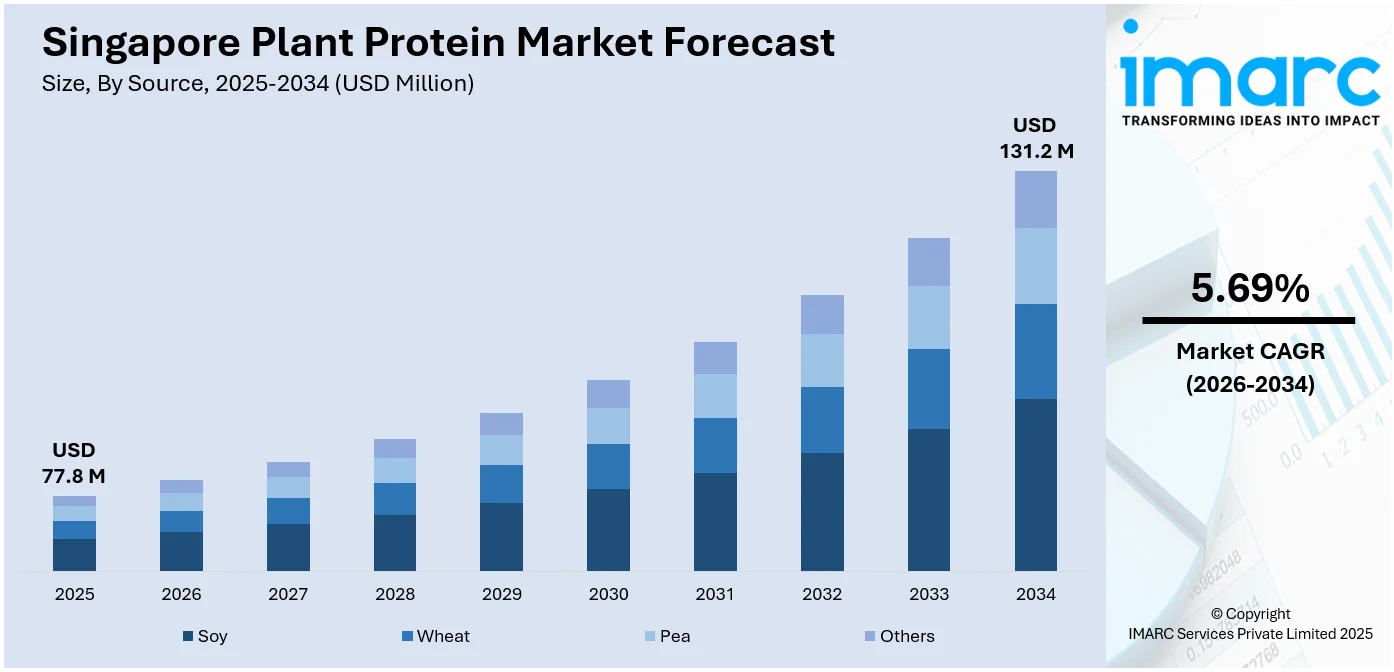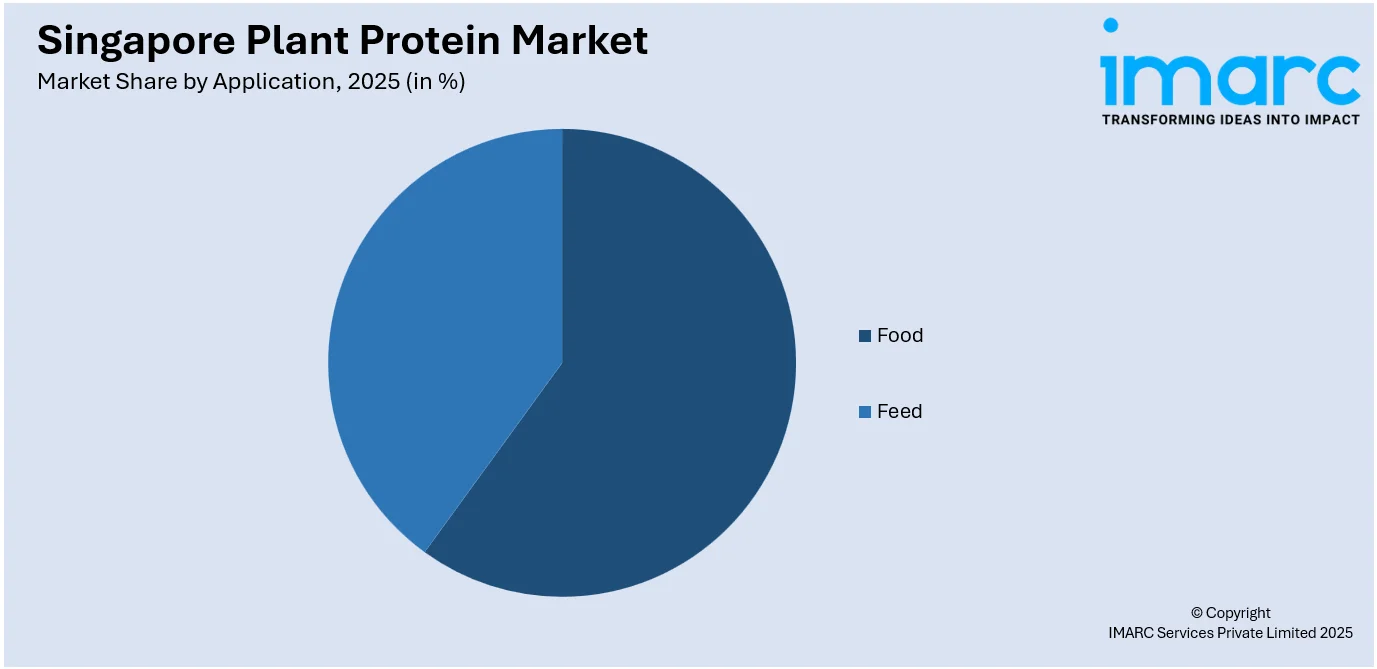
Singapore Plant Protein Market Size, Share, Trends and Forecast by Source, Type, Nature, Application, and Region, 2026-2034
Singapore Plant Protein Market Overview:
The Singapore plant protein market size reached USD 77.8 Million in 2025. Looking forward, IMARC Group expects the market to reach USD 131.2 Million by 2034, exhibiting a growth rate (CAGR) of 5.69% during 2026-2034. The market in Singapore is majorly driven by the increasing consumer awareness about health and wellness, environmental and ethical considerations, technological advancements in food production, supportive government policies, urbanization and lifestyle changes, culinary innovation, strategic partnerships, and the influential role of social media and digital marketing.
|
Report Attribute
|
Key Statistics
|
|---|---|
|
Base Year
|
2025 |
|
Forecast Years
|
2026-2034
|
|
Historical Years
|
2020-2025
|
| Market Size in 2025 | USD 77.8 Million |
| Market Forecast in 2034 | USD 131.2 Million |
| Market Growth Rate (2026-2034) | 5.69% |
Singapore Plant Protein Market Trends:
Growing Consumer Awareness Regarding Health and Wellness
The growing consumer focus on health and wellness is augmenting the growth of the market. As more individuals become conscious of the health implications of their dietary choices, there is a noticeable shift towards plant-based diets. Plant proteins offer several benefits including improved lipid profile, decreased incidence of chronic diseases, such as heart diseases, diabetes, and cancer. Also, plant proteins contain lesser levels of saturated fats and cholesterol than animal proteins which along with its positive nutrition profile, further enhances plant proteins’ desirability. This has highly been observed in the urban cultures where lifestyle-related health issues are more prevalent. The need to increase plant protein intake is further supported by the growing concern with fitness and healthy living and individuals focused efforts on purchasing high-quality food products that would improve their physical performance and overall health.

To get more information on this market Request Sample
Changing Environmental and Ethical Considerations
The problems associated with animal agriculture such as emission of greenhouse gases, expansion of animal farming land and water use are some of the factors that have prompted many consumers into changing their diets. Consumption of plant-based proteins is more sustainable for the environment than consumption of animal-based proteins. In addition, ethical values regarding animals are also affecting consumption trends, as many individuals are turning to vegan diets in order not to contribute to the ethical injustices found within the animal farming sector. This shift is supported by increased advocacy and awareness campaigns by environmental and animal rights organizations, which highlight the benefits of plant-based eating for both the planet and animal welfare. The correlation between veganism and the principles of sustainable and ethical consumption makes it even more attractive for individuals interested in environmental issues and social justice.
Technological Advancements in Food Production
Emerging innovations in food production and processing are significantly supporting the market. Developments in food technology have enabled the development of a wide variety of plant-based protein products that mimic the taste, texture, and nutritional profile of traditional animal-based products. These advancements include the use of novel protein sources such as pea, hemp, and algae, as well as improved processing techniques that enhance the palatability and functionality of plant proteins. The growth of food tech startups and increased investment in research and development have accelerated the introduction of new and improved plant-based products in the market. Furthermore, the use of biotechnological methods such as fermentation and cell culture technologies is paving the way for next-generation plant protein products that offer superior sensory attributes and nutritional benefits. These technological innovations are making plant-based proteins more accessible and appealing to a broader range of consumers, thereby driving market growth.
Supportive Government Policies and Initiatives
Government promoted policies and actions are useful in mainstreaming the plant protein market in Singapore. The government of the Republic of Singapore concerning food security and sustainable food systems has also implemented strategies and plans. Moreover, the effect of social media campaigns and other informative materials promoting and explaining the advantages of plant-based diets among the consumers also plays a significant role. This synergy provided by government agencies along with research institutes as well as players in the global plant protein market creates a positive market outlook. It supports local production and consumption of plant protein and helps Singapore to emerge as one of the most prominent APIN nations in the region.
Singapore Plant Protein Market News:
- On 19th December 2023, IFF expanded partnership with Kemira to commercialize new designed enzymatic biomaterials. The collaboration addresses Kemira's growing demand for alternatives to traditional fossil-based synthetic polymers across pulp, paper, and paper-based packaging markets and in industrial and municipal water treatment sectors.
- On 12th April 2023, Archer Daniels Midland signed a non-exclusive memorandum of understanding with believer meats to collaborate on propelling development and commercialization of cultivated meat products.
Singapore Plant Protein Market Segmentation:
IMARC Group provides an analysis of the key trends in each segment of the market, along with forecasts at the country level for 2026-2034. Our report has categorized the market based on source, type, nature, and application.
Source Insights:
- Soy
- Wheat
- Pea
- Others
The report has provided a detailed breakup and analysis of the market based on the source. This includes soy, wheat, pea, and others.
Type Insights:
- Concentrates
- Isolates
- Textured
A detailed breakup and analysis of the market based on the type have also been provided in the report. This includes concentrates, isolates, and textured.
Nature Insights:
- Conventional
- Organic
A detailed breakup and analysis of the market based on the application have also been provided in the report. This includes conventional and organic.
Application Insights:

Access the comprehensive market breakdown Request Sample
- Food
- Meat Alternatives
- Dairy Alternatives
- Bakery Products
- Performance Nutrition
- Convenience Foods
- Others
- Feed
A detailed breakup and analysis of the market based on the application have also been provided in the report. This includes food (meat alternatives, dairy alternatives, bakery products, performance nutrition, convenience foods, and others) and feed
Regional Insights:
- North-East
- Central
- West
- East
- North
The report has also provided a comprehensive analysis of all the major regional markets, which include North-East, Central, West, East, and North.
Competitive Landscape:
The market research report has also provided a comprehensive analysis of the competitive landscape in the market. Competitive analysis such as market structure, key player positioning, top winning strategies, competitive dashboard, and company evaluation quadrant has been covered in the report. Also, detailed profiles of all major companies have been provided.
Singapore Plant Protein Market Report Coverage:
| Report Features | Details |
|---|---|
| Base Year of the Analysis | 2025 |
| Historical Period | 2020-2025 |
| Forecast Period | 2026-2034 |
| Units | Million USD |
| Scope of the Report | Exploration of Historical Trends and Market Outlook, Industry Catalysts and Challenges, Segment-Wise Historical and Future Market Assessment:
|
| Sources Covered | Soy, Wheat, Pea, Others |
| Types Covered | Concentrates, Isolates, Textured |
| Natures Covered | Conventional, Organic |
| Applications Covered |
|
| Regions Covered | North-East, Central, West, East, North |
| Customization Scope | 10% Free Customization |
| Post-Sale Analyst Support | 10-12 Weeks |
| Delivery Format | PDF and Excel through Email (We can also provide the editable version of the report in PPT/Word format on special request) |
Key Benefits for Stakeholders:
- IMARC’s industry report offers a comprehensive quantitative analysis of various market segments, historical and current market trends, market forecasts, and dynamics of the Singapore plant protein market from 2020-2034.
- The research report provides the latest information on the market drivers, challenges, and opportunities in the Singapore plant protein market.
- Porter's five forces analysis assist stakeholders in assessing the impact of new entrants, competitive rivalry, supplier power, buyer power, and the threat of substitution. It helps stakeholders to analyze the level of competition within the Singapore plant protein industry and its attractiveness.
- Competitive landscape allows stakeholders to understand their competitive environment and provides an insight into the current positions of key players in the market.
Key Questions Answered in This Report
The Singapore plant protein market was valued at USD 77.8 Million in 2025.
The Singapore plant protein market is projected to exhibit a CAGR of 5.69% during 2026-2034, reaching a value of USD 131.2 Million by 2034.
The Singapore plant protein market is driven by rising health consciousness, demand for sustainable food sources, and government support for alternative proteins. Urban consumers are increasingly adopting flexitarian diets, while food tech innovations and a strong startup ecosystem contribute to the growth of plant-based meat, dairy, and functional protein products.
Need more help?
- Speak to our experienced analysts for insights on the current market scenarios.
- Include additional segments and countries to customize the report as per your requirement.
- Gain an unparalleled competitive advantage in your domain by understanding how to utilize the report and positively impacting your operations and revenue.
- For further assistance, please connect with our analysts.
 Request Customization
Request Customization
 Speak to an Analyst
Speak to an Analyst
 Request Brochure
Request Brochure
 Inquire Before Buying
Inquire Before Buying




.webp)




.webp)












